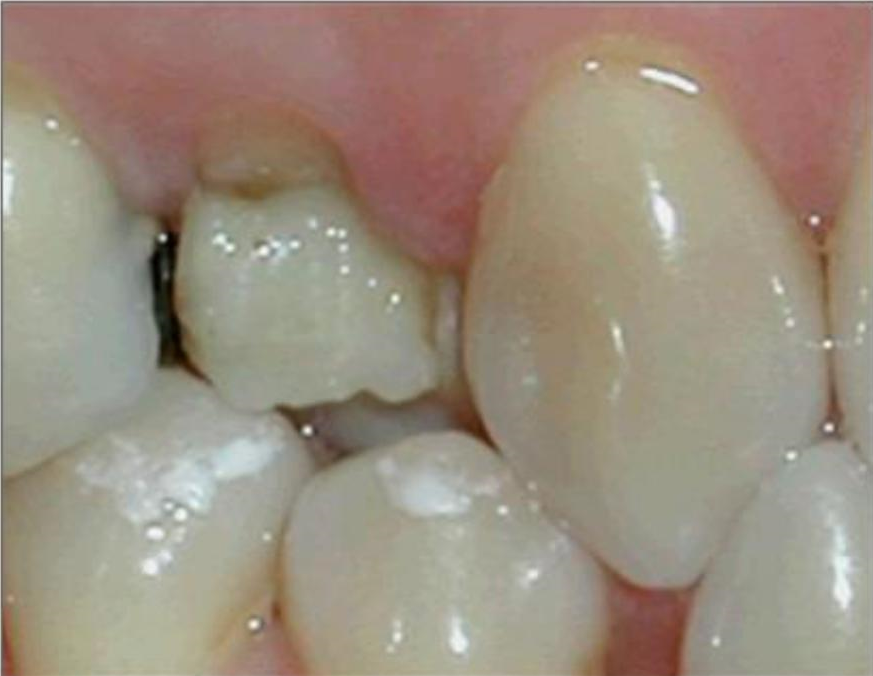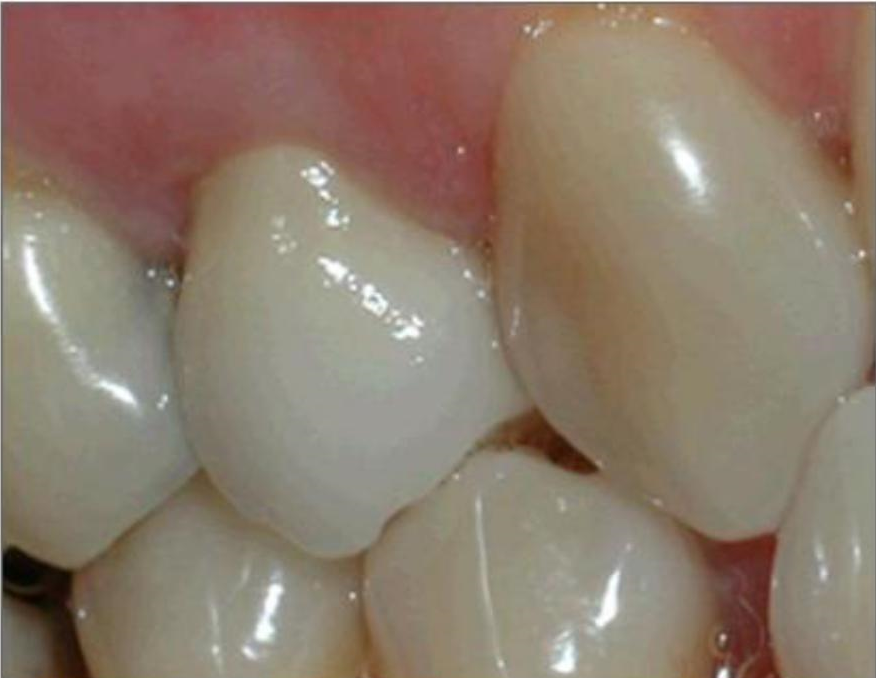
Dental Crowns
A dental crown is a tooth shaped ‘cap’ that is placed over a tooth which has previously been prepared, the crown will provide strength/reinforcement, replace lost tooth tissue and improve the aesthetics of the tooth. We have been working with the same laboratories for many years to help produce accurate and aesthetic crowns for our patients.


Before After
Reasons for crowning a tooth include:
- Broken/Fractured teeth
- Heavily filled teeth - teeth at risk of fracture due to loss of tooth tissue and large or multiple fillings
- After a root treatment on a back tooth – provide reinforcement of the remaining tooth tissue and provide a seal against bacteria leaking into the root filling which is a common cause of failure of root treatment
- Cosmetic reasons – discoloured teeth or teeth that we want to change the size or shape of
Types of Crown
Crowns are available on the NHS or Privately. The NHS offers crowns that are usually metal-fused to porcelain (ceramic) for front teeth and premolars, while full metal crowns that are usually silver in appearance are offered for molar teeth (back teeth).
Aesthetic all ceramic crowns and tooth-coloured crowns on molar teeth are not available on the NHS however you can opt to have these cosmetic options privately. All ceramic crowns can look very realistic and natural while being very strong, the strength is further reinforced by the adhesive cement that is used to place them, it decreases fracture risk and decreases the risks of leakage- these crowns can sometimes be impossible to differentiate from your natural teeth!
Procedure
The procedure for a crown preparation involves two visits, usually with a two week interval which allows the lab to create your custom made crown.
The first visit takes between 40-60 minutes, during this visit the tooth is prepared which involves filing down the tooth to the proper shape to retain the crown (sometimes the tooth is built up first if the tooth is very broken). Then a dental impression is taken to record the tooth and your bite, next a shade is agreed upon. Before you leave your dentist will cover the prepared tooth with a temporary crown- this should reduce sensitivity, maintain the aesthetic after the tooth has been filed and importantly maintain the space around the tooth and the bite (teeth can move position- please contact the team if your temporary crown come loose or is lost as his can affect the fit of your crown)
The second visit is a much shorter appointment, during this time your dentist will remove the temporary crown and try in the lab made crown, once happy the crown will be cemented into position. After this time it may take a short while to get used to your crown, however after this has settled the tooth should appear and function like a normal tooth.
Dental Crowns
A dental crown is a tooth shaped ‘cap’ that is placed over a tooth which has previously been prepared, the crown will provide strength/reinforcement, replace lost tooth tissue and improve the aesthetics of the tooth. We have been working with the same laboratories for many years to help produce accurate and aesthetic crowns for our patients.


Before After
Reasons for crowning a tooth include:
- Broken/Fractured teeth
- Heavily filled teeth - teeth at risk of fracture due to loss of tooth tissue and large or multiple fillings
- After a root treatment on a back tooth – provide reinforcement of the remaining tooth tissue and provide a seal against bacteria leaking into the root filling which is a common cause of failure of root treatment
- Cosmetic reasons – discoloured teeth or teeth that we want to change the size or shape of
Types of Crown
Crowns are available on the NHS or Privately. The NHS offers crowns that are usually metal-fused to porcelain (ceramic) for front teeth and premolars, while full metal crowns that are usually silver in appearance are offered for molar teeth (back teeth).
Aesthetic all ceramic crowns and tooth-coloured crowns on molar teeth are not available on the NHS however you can opt to have these cosmetic options privately. All ceramic crowns can look very realistic and natural while being very strong, the strength is further reinforced by the adhesive cement that is used to place them, it decreases fracture risk and decreases the risks of leakage- these crowns can sometimes be impossible to differentiate from your natural teeth!
Procedure
The procedure for a crown preparation involves two visits, usually with a two week interval which allows the lab to create your custom made crown.
The first visit takes between 40-60 minutes, during this visit the tooth is prepared which involves filing down the tooth to the proper shape to retain the crown (sometimes the tooth is built up first if the tooth is very broken). Then a dental impression is taken to record the tooth and your bite, next a shade is agreed upon. Before you leave your dentist will cover the prepared tooth with a temporary crown- this should reduce sensitivity, maintain the aesthetic after the tooth has been filed and importantly maintain the space around the tooth and the bite (teeth can move position- please contact the team if your temporary crown come loose or is lost as his can affect the fit of your crown)
The second visit is a much shorter appointment, during this time your dentist will remove the temporary crown and try in the lab made crown, once happy the crown will be cemented into position. After this time it may take a short while to get used to your crown, however after this has settled the tooth should appear and function like a normal tooth.

